| Listing 1 - 10 of 34 | << page >> |
Sort by
|
Book
ISBN: 0804787158 9780804787154 0804785805 9780804785808 Year: 2013 Publisher: Stanford, Calif. Stanford University Press
Abstract | Keywords | Export | Availability | Bookmark
 Loading...
Loading...Choose an application
- Reference Manager
- EndNote
- RefWorks (Direct export to RefWorks)
Constructing Cassandra analyzes the intelligence failures at the CIA that resulted in four key strategic surprises experienced by the US: the Cuban Missile Crisis in 1962, the Iranian revolution of 1978, the collapse of the USSR in 1991, and the 9/11 terrorist attacks—surprises still play out today in U.S. policy. Although there has been no shortage of studies exploring how intelligence failures can happen, none of them have been able to provide a unified understanding of the phenomenon. To correct that omission, this book brings culture and identity to the foreground to present a unified model of strategic surprise; one that focuses on the internal make-up the CIA, and takes seriously those Cassandras who offered warnings, but were ignored. This systematic exploration of the sources of the CIA's intelligence failures points to ways to prevent future strategic surprises.
Intelligence service --- History. --- United States. --- National Security Council (U.S.) --- Agjencia Qendrore e Inteligjencës --- Central Intelligence Agency (U.S.) --- CIA (Central Intelligence Agency) --- CIP (United States. Centrālās izlūkošanas pārvalde) --- Mei-kuo chung yang chʻing pao chü --- National Security Council (U.S.). --- Si Aing Ei --- T︠S︡entralʹnoe razvedyvatelʹnoe upravlenie SShA --- T︠S︡RU SShA --- T︠S︡RU (T︠S︡entralʹnoe razvedyvatelʹnoe upravlenie SShA) --- ЦРУ США --- ЦРУ (Центральное разведывательное управление США) --- Центральное разведывательное управление США --- ארצות הברית. --- 美國.
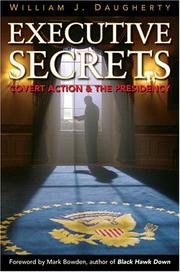
ISBN: 0813191610 1283232979 9786613232977 0813171962 9780813191614 9780813171968 9780813137834 0813137837 9781283232975 6613232971 0813123348 9780813123349 Year: 2006 Publisher: Lexington, Ky University Press of Kentucky
Abstract | Keywords | Export | Availability | Bookmark
 Loading...
Loading...Choose an application
- Reference Manager
- EndNote
- RefWorks (Direct export to RefWorks)
"" A HISTORY BOOK CLUB SELECTION With a Foreword by Mark Bowden, author of Black Hawk Down
Espionage --- Presidents --- Intelligence service --- History --- United States. --- National Security Council (U.S.) --- Agjencia Qendrore e Inteligjencës --- Central Intelligence Agency (U.S.) --- CIA (Central Intelligence Agency) --- CIP (United States. Centrālās izlūkošanas pārvalde) --- Mei-kuo chung yang chʻing pao chü --- National Security Council (U.S.). --- Si Aing Ei --- T︠S︡entralʹnoe razvedyvatelʹnoe upravlenie SShA --- T︠S︡RU SShA --- T︠S︡RU (T︠S︡entralʹnoe razvedyvatelʹnoe upravlenie SShA) --- ЦРУ США --- ЦРУ (Центральное разведывательное управление США) --- Центральное разведывательное управление США --- ארצות הברית. --- 美國. --- United States --- Foreign relations --- International relations. Foreign policy --- Polemology --- United States of America
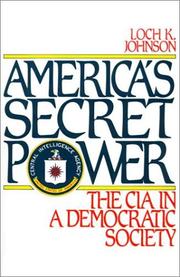
ISBN: 1429401117 9781429401111 1280525762 9781280525766 0195069447 0195054903 9780195054903 9780195069440 9780195361537 0195361539 0197732836 Year: 1989 Publisher: New York Oxford University Press
Abstract | Keywords | Export | Availability | Bookmark
 Loading...
Loading...Choose an application
- Reference Manager
- EndNote
- RefWorks (Direct export to RefWorks)
United States. Central Intelligence Agency --- Intelligence service --- United States --- United States. --- Agjencia Qendrore e Inteligjencës --- Central Intelligence Agency (U.S.) --- CIA (Central Intelligence Agency) --- CIP (United States. Centrālās izlūkošanas pārvalde) --- Mei-kuo chung yang chʻing pao chü --- National Security Council (U.S.). --- Si Aing Ei --- T︠S︡entralʹnoe razvedyvatelʹnoe upravlenie SShA --- T︠S︡RU SShA --- T︠S︡RU (T︠S︡entralʹnoe razvedyvatelʹnoe upravlenie SShA) --- ЦРУ США --- ЦРУ (Центральное разведывательное управление США) --- Центральное разведывательное управление США --- ארצות הברית. --- 美國. --- National Security Council (U.S.) --- VIE INTERNATIONALE --- POLITIQUE ETRANGERE --- POLITIQUE DE SECURITE --- RENSEIGNEMENT-ESPIONNAGE --- ETATS-UNIS --- Political science.
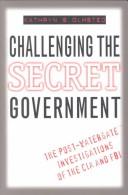
ISBN: 080786370X 0585025630 9780585025636 9780807863701 080782254X 0807845620 9780807822548 9780807845622 9798890883858 Year: 1996 Publisher: Chapel Hill University of North Carolina Press
Abstract | Keywords | Export | Availability | Bookmark
 Loading...
Loading...Choose an application
- Reference Manager
- EndNote
- RefWorks (Direct export to RefWorks)
Watergate Affair, 1972-1974. --- Intelligence service --- Watergate Scandal, 1972-1974 --- Political corruption --- United States. --- Agjencia Qendrore e Inteligjencës --- Central Intelligence Agency (U.S.) --- CIA (Central Intelligence Agency) --- CIP (United States. Centrālās izlūkošanas pārvalde) --- Mei-kuo chung yang chʻing pao chü --- National Security Council (U.S.). --- Si Aing Ei --- T︠S︡entralʹnoe razvedyvatelʹnoe upravlenie SShA --- T︠S︡RU SShA --- T︠S︡RU (T︠S︡entralʹnoe razvedyvatelʹnoe upravlenie SShA) --- ЦРУ США --- ЦРУ (Центральное разведывательное управление США) --- Центральное разведывательное управление США --- ארצות הברית. --- 美國. --- National Security Council (U.S.) --- FBI --- FBR --- Federal Bureau of Investigation (U.S.) --- Federalʹnoe bi︠u︡ro rassledovaniĭ v SShA
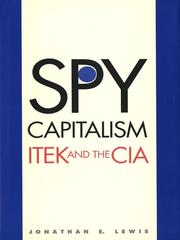
ISBN: 1281729388 9786611729387 030012905X 9780300129052 9780300091922 0300091923 9781281729385 Year: 2002 Publisher: New Haven Yale University Press
Abstract | Keywords | Export | Availability | Bookmark
 Loading...
Loading...Choose an application
- Reference Manager
- EndNote
- RefWorks (Direct export to RefWorks)
What happens when the world of venture capital collides with the world of espionage? To find the answer, Jonathan E. Lewis takes us inside the executive suite at Itek Corporation during the Cold War years from 1957 to 1965. Itek was manufacturing the world's most sophisticated satellite reconnaissance cameras, and the information these cameras provided about Soviet missiles and military activity was critical to U.S. security. So was Itek. This intriguing book examines in unprecedented detail the challenges Itek faced not only as a contractor for the most important national security program of the time-the CIA's Project CORONA spy satellite-but also as a start-up company competing with established industrial giants. In telling the story of Itek Corporation, Lewis fills important gaps in the history of American intelligence, business history, and management studies. In addition, he addresses a variety of important themes such as the compatibility of secrecy and capitalism, the struggle between profits and patriotism, and the workings of power and connections in America. Lewis explores how Itek executives contended with myriad business problems that were compounded by the need to raise capital without revealing the complete truth about the company's highly secret business. He also presents for the first time information about Laurance Rockefeller's venture capital operations and his role in financing Itek, based on the financier's private Itek papers. The book is both a remarkable case study of a company at the heart of the American intelligence-industrial complex during the Cold War and a thought-provoking examination of the impact of the CIA on the capitalist system it was created to defend.
HISTORY / General. --- Rockefeller, Laurance Spelman. --- United States. --- Itek Corporation. --- National Security Council (U.S.) --- Agjencia Qendrore e Inteligjencës --- Central Intelligence Agency (U.S.) --- CIA (Central Intelligence Agency) --- CIP (United States. Centrālās izlūkošanas pārvalde) --- Mei-kuo chung yang chʻing pao chü --- National Security Council (U.S.). --- Si Aing Ei --- T︠S︡entralʹnoe razvedyvatelʹnoe upravlenie SShA --- T︠S︡RU SShA --- T︠S︡RU (T︠S︡entralʹnoe razvedyvatelʹnoe upravlenie SShA) --- ЦРУ США --- ЦРУ (Центральное разведывательное управление США) --- Центральное разведывательное управление США --- ארצות הברית. --- 美國.
Book
ISBN: 128369218X 0299288536 9780299288532 9781283692182 9780299288549 0299288544 Year: 2012 Publisher: Madison The University of Wisconsin Press
Abstract | Keywords | Export | Availability | Bookmark
 Loading...
Loading...Choose an application
- Reference Manager
- EndNote
- RefWorks (Direct export to RefWorks)
Impunity --- Military interrogation --- Torture --- Privileges and immunities --- Punishment --- Questioning --- Cruelty --- Extraordinary rendition --- History. --- Government policy --- United States. --- National Security Council (U.S.) --- Agjencia Qendrore e Inteligjencës --- Central Intelligence Agency (U.S.) --- CIA (Central Intelligence Agency) --- CIP (United States. Centrālās izlūkošanas pārvalde) --- Mei-kuo chung yang chʻing pao chü --- National Security Council (U.S.). --- Si Aing Ei --- T︠S︡entralʹnoe razvedyvatelʹnoe upravlenie SShA --- T︠S︡RU SShA --- T︠S︡RU (T︠S︡entralʹnoe razvedyvatelʹnoe upravlenie SShA) --- ЦРУ США --- ЦРУ (Центральное разведывательное управление США) --- Центральное разведывательное управление США --- ארצות הברית. --- 美國.
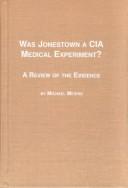
ISBN: 0773416773 9780773416772 0889460132 9780889460133 Year: 1989 Publisher: Lewiston Edwin Mellen Press
Abstract | Keywords | Export | Availability | Bookmark
 Loading...
Loading...Choose an application
- Reference Manager
- EndNote
- RefWorks (Direct export to RefWorks)
A work of investigative journalism that presents the theory that the Central Intelligence Agency employed the Reverend Jim Jones to administer a pharmaceutical field test in mind control and ethnic weaponry to a large test group, namely the membership of the Peoples Temple. Proposes that Dr. Laurence Layton (Former Chief of the U.S. Army's Chemical and Biological Warfare Division) cultured the AIDS virus to be tested and deployed in a CIA-backed experiment in Jonestown, Guyana.
Brainwashing. --- Jones, Jim, 1931-1978. --- Jonestown Mass Suicide, Jonestown, Guyana, 1978. --- United States. Central Intelligence Agency. --- Jones, Jim, --- United States. --- Jones, James Warren, --- Jones, Jimmie, --- Agjencia Qendrore e Inteligjencës --- Central Intelligence Agency (U.S.) --- CIA (Central Intelligence Agency) --- CIP (United States. Centrālās izlūkošanas pārvalde) --- Mei-kuo chung yang chʻing pao chü --- National Security Council (U.S.). --- Si Aing Ei --- T︠S︡entralʹnoe razvedyvatelʹnoe upravlenie SShA --- T︠S︡RU SShA --- T︠S︡RU (T︠S︡entralʹnoe razvedyvatelʹnoe upravlenie SShA) --- ЦРУ США --- ЦРУ (Центральное разведывательное управление США) --- Центральное разведывательное управление США --- ארצות הברית. --- 美國. --- National Security Council (U.S.)
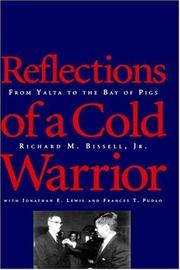
ISBN: 0300146108 0585379122 9780585379128 9780300146103 0300064306 9780300064308 Year: 1996 Publisher: New Haven Yale University Press
Abstract | Keywords | Export | Availability | Bookmark
 Loading...
Loading...Choose an application
- Reference Manager
- EndNote
- RefWorks (Direct export to RefWorks)
Richard M. Bissell, Jr., the most important CIA spymaster in history, singlehandedly led America's intelligence service from the age of Mata Hari into the space age. Under his guidance the U-2 spy-plane, the SR-71 "Blackbird," and the Corona spy satellite were developed, and the agency rose to the pinnacle of its power. Bissell was also, however, the architect of the infamous Bay of Pigs operation that failed to overthrow Castro in 1961 and led to the decline of the CIA. In this compelling memoir, Bissell gives us an insider's view of the personalities, policies, and historical forces surrounding these and other covert operations and the lessons learned during those times of conflict.Bissell begins by describing his early years as a member of America's unofficial aristocracy. Born in a house that his father bought from Samuel Clemens, he was educated at Groton and Yale and befriended by Charles and Anne Morrow Lindbergh, among others. Bissell recounts how he became acting head of the Economic Cooperation Administration, the agency in charge of the Marshall Plan after World War II, and helped to create the European Payments Union. Bissell was brought into the CIA in 1954, where he initiated a revolution in intelligence-gathering techniques. He reveals the details of these developments, as well as of the unique CIA-Lockheed partnership he pioneered, his participation in the CIA-sponsored coup to overthrow Arbenz in Guatemala, and his involvement in crises in Laos and the Congo. Bissell's memoir sheds light not only on pivotal points of American foreign policy but also on America's evolution from isolationist to interventionist superpower.
Intelligence officers --- Bissell, Richard M. --- United States. --- National Security Council (U.S.) --- Agjencia Qendrore e Inteligjencës --- Central Intelligence Agency (U.S.) --- CIA (Central Intelligence Agency) --- CIP (United States. Centrālās izlūkošanas pārvalde) --- Mei-kuo chung yang chʻing pao chü --- National Security Council (U.S.). --- Si Aing Ei --- T︠S︡entralʹnoe razvedyvatelʹnoe upravlenie SShA --- T︠S︡RU SShA --- T︠S︡RU (T︠S︡entralʹnoe razvedyvatelʹnoe upravlenie SShA) --- ЦРУ США --- ЦРУ (Центральное разведывательное управление США) --- Центральное разведывательное управление США --- ארצות הברית. --- 美國. --- History.
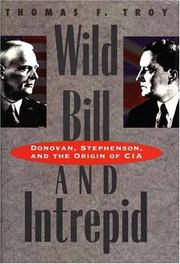
ISBN: 0585355436 9780585355436 0300065639 Year: 1996 Publisher: New Haven : Yale University Press,
Abstract | Keywords | Export | Availability | Bookmark
 Loading...
Loading...Choose an application
- Reference Manager
- EndNote
- RefWorks (Direct export to RefWorks)
Intelligence officers --- Biography. --- Donovan, William J. --- Stephenson, William Samuel, --- Donovan, William Joseph, --- Donovan, Bill, --- Donovan, Wild Bill, --- Stephenson, William, --- United States. --- National Security Council (U.S.) --- Agjencia Qendrore e Inteligjencës --- Central Intelligence Agency (U.S.) --- CIA (Central Intelligence Agency) --- CIP (United States. Centrālās izlūkošanas pārvalde) --- Mei-kuo chung yang chʻing pao chü --- National Security Council (U.S.). --- Si Aing Ei --- T︠S︡entralʹnoe razvedyvatelʹnoe upravlenie SShA --- T︠S︡RU SShA --- T︠S︡RU (T︠S︡entralʹnoe razvedyvatelʹnoe upravlenie SShA) --- ЦРУ США --- ЦРУ (Центральное разведывательное управление США) --- Центральное разведывательное управление США --- ארצות הברית. --- 美國. --- History.
Book
ISBN: 1681140365 9781681140360 9781937536824 Year: 2015 Publisher: Stone Mountain, GA
Abstract | Keywords | Export | Availability | Bookmark
 Loading...
Loading...Choose an application
- Reference Manager
- EndNote
- RefWorks (Direct export to RefWorks)
Presidents --- Assassination --- Kennedy, John F. --- Kennedy, John Fitzgerald --- United States. --- History --- Agjencia Qendrore e Inteligjencës --- Central Intelligence Agency (U.S.) --- CIA (Central Intelligence Agency) --- CIP (United States. Centrālās izlūkošanas pārvalde) --- Mei-kuo chung yang chʻing pao chü --- National Security Council (U.S.). --- Si Aing Ei --- T︠S︡entralʹnoe razvedyvatelʹnoe upravlenie SShA --- T︠S︡RU SShA --- T︠S︡RU (T︠S︡entralʹnoe razvedyvatelʹnoe upravlenie SShA) --- ЦРУ США --- ЦРУ (Центральное разведывательное управление США) --- Центральное разведывательное управление США --- ארצות הברית. --- 美國. --- National Security Council (U.S.)
| Listing 1 - 10 of 34 | << page >> |
Sort by
|

 Search
Search Feedback
Feedback About UniCat
About UniCat  Help
Help News
News